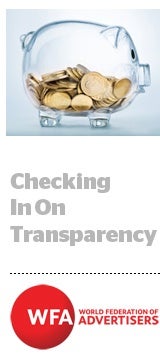 Marketers across the globe are adapting their relationships with agency trading desks to gain greater transparency into programmatic buys, according to the World Federation of Advertisers (WFA).
Marketers across the globe are adapting their relationships with agency trading desks to gain greater transparency into programmatic buys, according to the World Federation of Advertisers (WFA).
Ninety percent of members belonging to the European trade body are reviewing their contracts with agency trading desks to gain more control and transparency, the organization said in a report released Monday. The WFA, which represents Procter & Gamble, Unilever and other advertisers, surveyed executives in global media positions at 59 member companies across 18 verticals about their evolving relationships with trading desks.
When programmatic was emerging, many marketers handed budgets to agency trading desks without a formal pitch process or contract in place, said Matt Green, head of global media and digital marketing at the WFA. Now that programmatic is an essential part of the media plan, marketers are looking for more formalities to protect their interests.
“In the original days, people were implying that their agencies had maybe not nudged them into programmatic, but it became a default thing,” he said. “Now people are spending so much money in programmatic, and they recognize a need to put this more formal wrapper around it.”
While more than half of marketers that were surveyed still work with their agency trading desks, many are also working with independent trading desks, which can range from a client licensing and operating a demand-side platform in-house to working with a programmatic shop not owned by a major holding company. Use of these entities has increased 12% since the WFA’s last survey in 2015.
But most marketers aren’t eliminating their agency trading desks completely. Seventy percent of respondents split their spend between independent and agency trading desks, and more than 20% of respondents embrace a hybrid model, whereby they own the technology contracts but the agency manages programmatic spend.
The WFA’s marketers have the scale to feasibly manage media in-house, but leaving the management to their agency is easier from a staffing and flexibility perspective, Green said.
“Some people say it’s easier to pay managing fees and be able to pull the plug on that at any point,” he said. “If I have people on the payroll, it’s a bit more difficult.”
Agency trading desks are adapting their models to fit client sentiment. Forty-two percent of holding companies have expanded programmatic capabilities down to the agency level, as clients often feel more comfortable working with their agency partners than standalone trading desks. Twenty-nine percent of respondents said such changes have made them satisfied with the transparency provided by their agency trading desk.
“People are coming to the big companies and saying, ‘We are happy to work with you on a programmatic scope, but don’t put me with those guys,’” Green said. “Holding companies are open to those conversations. Why wouldn’t they have a crack at that, if it means retaining the business?”
And despite transparency concerns, many marketers still prefer to work with trading desks because of their economies of scale, better rates and large geographic footprints. Keeping programmatic spend within the agency group also ensures consistency across their media plan.
“There are some very good reasons people would want to work with agency trading desks, and our results say a majority of people still do,” Green said. “The skill, data, understanding and leverage likely to be within the Xaxises of this world might still be overly attractive for some clients.”
Of course, transparency means different things in markets across the globe.
In the US, the term became almost scandalous last year when the Association of National Advertisers released a report detailing nontransparent agency practices and urging marketers to take control of their media spend. According to the WFA, 61% of marketers surveyed reject the notion that agencies should act as principal.
But in Asia, principal-based trading and other opaque practices are widely accepted.
“In China, the market is so densely opaque that it’s more or less totally accepted that this is going on,” Green said. “Japan is a fundamentally different market where it’s acknowledged, understood and accepted that agencies can be principal.”
However they may define transparency, marketers recognize the need to formalize contracts and take back control of their relationships with both their agencies and technology vendors.
“The most fundamental thing you have to do is reset and review your contacts,” Green said. “Everyone is doing that, more or less. It’s just good business.”












